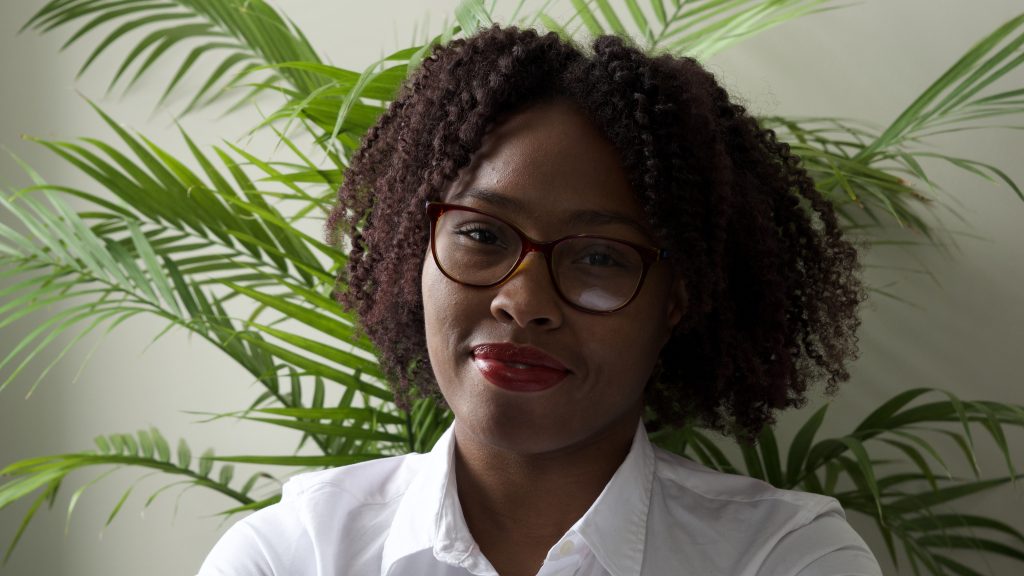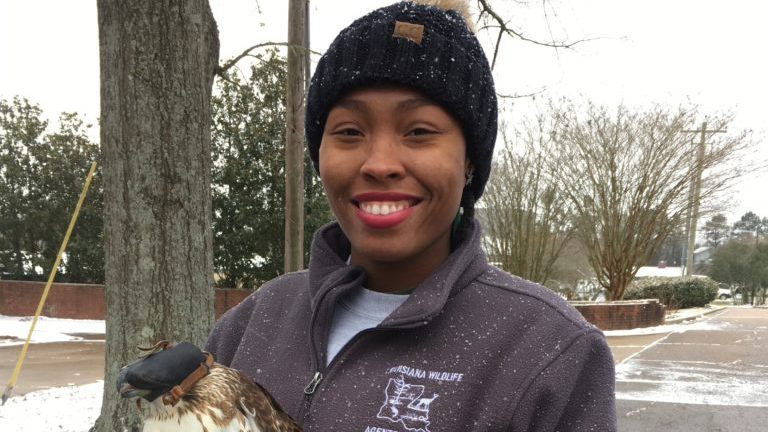Researcher Spotlight – Deja Perkins

2018-19 Global Change Fellow
Graduate Student, Department of Forestry and Environmental Resources Program in Fish, Wildlife and Conservation Biology
Advisor: Dr. Madhu Katti
Every year the Southeast Climate Adaptation Science Center funds a multi-disciplinary cohort of Global Change Fellows representing colleges across NC State University. Here are some highlights about 2018-19 Fellow, Deja Perkins, and the applied research she’s conducting.
About You
What do you study?
I am obtaining my degree in Wildlife and Fisheries Conservation Biology with a focus on Urban Ecology and Environmental Justice. I am looking into who uses citizen science platforms and how volunteer biases in data reporting of e-bird and systematic surveys might impact how management is applied in green spaces across urban areas. I am using birds as my focal species to look at the potential impacts.
What (or who) influenced you to go into this field of study?
I grew up in the heart of Chicago on the southeast side. I always had a passion for animals but was not allowed to spend a lot of time outdoors or “exploring nature.” In undergrad I realized that my wildlife centered classes focused on “wild” or “natural and untouched” spaces for conservation and only saw urban areas as centers for disturbance and pollution. However I know that urban areas can be much more than the negative connotation that is usually placed on them. By 2050 it is projected that there will be 10 billion people on earth, and most of them will probably live in cities. Therefore it is important that we include urban areas in the conversation when we think about conserving species and space for wildlife, and not think about cities as only negative influences on wildlife because a lot of species thrive there.
What do you think is the most pressing issue related to global change?
The most pressing issue, in my opinion, related to global change is making sure that low income and disadvantaged populations are better equipped to survive change. Low-income and minority communities are always the most heavily impacted when it comes to natural disasters, pollution etc. I think when we are coming up with solutions we need to implement change in those communities first, and ensure that they won’t have to bear the brunt of the effects and don’t get left behind/receive the worst impacts when it comes to climate change and urban development.
What is your dream job?
My dream job would be a job that consists of field work, planning, and community engagement. Any career where I am helping to create wildlife-friendly sustainable areas in urban low-income and minority neighborhoods and making a positive impact on human and wildlife communities would make me happy, whether I am doing the research on how to achieve those goals, working on the front lines and actually implementing the design and management of the areas, or helping to create policy or obtain funding. I’m not 100% positive what job title that would be or if a position like that exists currently, but hopefully I will find something that encompasses all of those tasks after I graduate.
About Your Research

What results are you finding?
What we have seen so far is that most participants in bird-based citizen science are in the middle-aged white demographic. From our preliminary results we are finding that neighborhood establishment age plays a big role in presence of bird species in the Raleigh Triangle area. We are still in the process of overlapping other factors such as income and neighborhood demographics.
Who will benefit from your research?
I hope that managers will use my research to locate the gaps in where management is applied in urban areas. I hope that this will help make green spaces more equitable for minority communities so they can have the same types of nature-based activities as higher income/wealthy neighborhoods.
How would you describe your research to a 3rd grader?
If speaking with a third grader I would say I study where birds live in cities and how studying bird populations can have a positive impact on the way parks look in their neighborhood and the types of programs that are available in their neighborhood parks. I also create programs to give children more exposure to nature and show how science applies in their everyday lives.
About Your Global Change Fellow Experience
How do you expect the SE CASC Global Change Fellows Program to impact you and your work?
One of the main ways that the SE CASC Global Change Fellows Program has impacted me is that it gave me training on decision making and stakeholder engagement which will be vital in my urban work. I believe I am better able to work with community needs instead of trampling communities with my own ideas on how to make things better. The SE CASC Global Change Fellows Program has also allowed me to think on a broader scale. Their travel funding allowed me to attend a summit on “The Nature of Cities” in Paris, France where I was able to interact with politicians, scientists, landscape architects and designers from all over the world to talk about how they envision the future of nature in cities, how we can build more sustainable cities, and how to make green living affordable for all. I was able to compare urban conservation work in the United States to various other countries and exchange ideas on how to build a better future.
- Categories:
